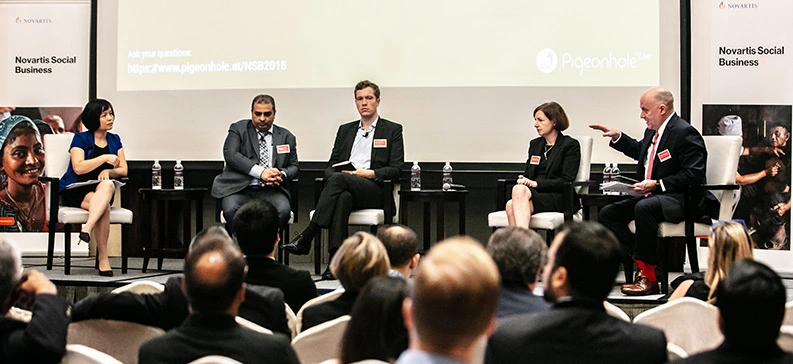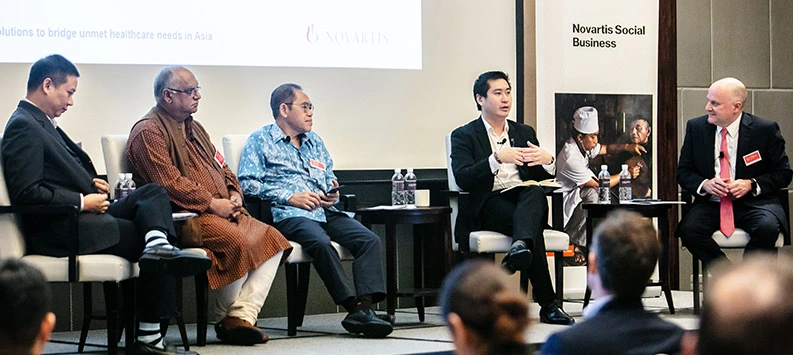Imagine living in a place where the nearest healthcare center is two to three hours away by bus, and the ticket price is your weekly or even monthly salary.
If you decide to take the bus, there is no guarantee that the doctor will be there. Because the only return bus leaves before the center closes, there is a good chance that you will need to leave without seeing the doctor, or spend more money getting a ride home on a tricycle. At the end of the day, the question is: How sick do you have to be before you are willing to see a doctor?
This dilemma is common in the Philippines, one of many developing countries in Asia with poor access to healthcare. In the region, noncommunicable diseases (NCDs) are the No. 1 killer, accounting for 62% of deaths1. While global health authorities have pledged to reduce the risk of premature mortality from NCDs by 25% by 20252, progress has been slow, and these chronic conditions might cost the global economy USD 47 trillion by 20303.
More than 100 people from 15 Asian countries who represented global public health, healthcare industry, digital tech, finance, nongovernmental organizations (NGOs), government and international media, came together on November 20 to discuss and identify solutions during the fourth Novartis Social Business stakeholder dialogue, held in Singapore. This year’s panelists brought multiple perspectives to each issue.
Welcome to the 4th Novartis Social Business stakeholder dialogue. Follow #talkingNCDs and check out the agenda as we are about to kick off https://t.co/lmSbFpdCwf pic.twitter.com/nVwWvhgDfl
— Novartis Social Business (@Novartis_NSB) November 20, 2018
Two women in their 30s stricken with breast cancer, two markedly different outcomes. For one, born and raised in Indonesia, it was death. For the other, a Canadian citizen, the cancer went into remission. A key factor contributing to these outcomes? Simply having access to treatment. Sharing this emotional and personal story, Mike Crichton of Sandoz called on everyone in the room to act now, quoting the American anthropologist Margaret Mead: “Never doubt that a small group of thoughtful, committed citizens can change the world; indeed, it’s the only thing that ever has.”
Kimberly Green of PATH conveyed the same sense of urgency in her keynote address. She described healthcare systems in developing countries in Asia as being at a crossroads, with the fight no longer being just against infectious diseases but also against the growing burden of NCDs.
#talkingNCDs Mike Crichton, Regional Head, AsiaPac, middle-east, Africa, Sandoz says if not now, when? If not us, who? It's fun to talk big solutions, but who reaches #patients with help? I want solutions yesterday!
— Vikas Dandekar (@VikasReports) November 20, 2018
During the first panel discussion on public-private partnerships (PPPs), Deborah Gildea of Novartis Social Business, Asia, underlined the need to include local communities in the design of healthcare solutions to increase the likelihood of success. As an example, she described how a local community in Cambodia donated a piece of land for a health center to be built by an NGO, funded by the private market and staffed by the government. Co-panelist Edward Booty has achieved similar success through his organization, Allied World Healthcare, which has implemented community-led and PPP services in rural areas in the Philippines and Cambodia.
Deborah Gildea: "The more we can do to engage the local community in the design of the solution [for solving NCDs], the better - because then they are part of the solution." #talkingNCDs
— Novartis Social Business (@Novartis_NSB) November 20, 2018
Outcomes matter, said Dhawal Jhamb of IFC. He highlighted the need for projects to have clear commitments and for information to be provided in a language that the patient can understand. The easiest way to measure performance may be through patient satisfaction matrices, he said, and there should be clear penalties for failure, including termination of contracts.
According to Nguyen Khanh Phuong of the Ministry of Health of Vietnam, patients need to be involved in governance. She suggested inviting members of patient or consumer associations to represent the rights of patients in communities where their voices may be weak.

Speakers participating in Panel 1 agreed that PPPs can help keep older populations healthy through new ways of working together that deliver benefits for nations and shareholders.
Dhawal Jhamb: "PPPs (public private partnerships) in health sector are gaining popularity in many countries, especially in order to meet universal health coverage (UHC) goals" #talkingNCDs
— Novartis Social Business (@Novartis_NSB) November 20, 2018
Panel 2 addressed how the challenge of NCDs will require innovative financing solutions as well as traditional methods, such as insurance schemes. Yet the somewhat counterintuitive nature of insurance plans, whereby money is paid regularly but can only be used when someone has an illness, makes them hard to implement, said Vijay Mahajan of the Rajiv Gandhi Foundation.
The savings plan – a lockbox arrangement where the money remains yours but you can only make withdrawals upon a doctor’s prescription – gets better acceptance from communities. The profits, accumulated over time, can then be used to fund insurance premiums.
The mandatory national health insurance scheme in Indonesia, launched five years ago, has ensured much greater healthcare access for all citizens, said Hasbullah Thabrany of ThinkWell.
Jeremy Lim: "The more healthcare we provide, the more expensive it will be. When looking at other industries, we see different ways to reduce cost, for example, by technological innovations." #talkingNCDs
— Novartis Social Business (@Novartis_NSB) November 20, 2018
Jeremy Lim of Oliver Wyman maintained that the healthcare industry can learn lessons from the auto and banking industries, which have been forced to deliver products and services more efficiently. There are many opportunities resulting from unmet needs and the waste generated from late diagnosis and excessive care, he said. Technology can help generate key insights and lead to solutions that appeal to investors.
Impact investing with the intention to generate measurable social impact alongside financial return, can enable investors to play a role in this transformation of health services, said Leon Toh of Damson Capital. “Impact investing is not so complex. Lots of small challenges when put together become a web of complexity,” he said. “When taken individually, it becomes very easy to solve. There are simple ways to get very good outcomes.”
Panel 2 concluded that there is not one model for innovative financing. Rather, there are many models that can support the transformation in health services. These models should deliver both the funding and the tools that financial markets use to assess progress against defined goals.

During his closing remarks, Harald Nusser of Novartis Social Business said that the focus needs to be on treating people and not diseases. He stressed the importance of monitoring and evaluation, considering outputs as well as outcomes, and transparently sharing data. Technology can bring not just greater efficiency but insights that will make sure that services are delivering an impact.